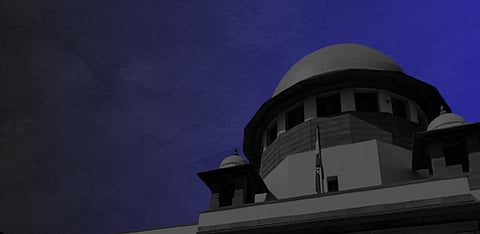

Senior advocate Indira Jaising, who appeared for the petitioners, also drew attention to the fact that caste discrimination at university campuses is not a secluded phenomenon. Many prominent universities have witnessed incidents of suicide due to caste discrimination in the current year. The Supreme Court Bench told the University Grants Commission (UGC) counsel that since the litigation is non-adversarial, rather than replying in the nature of objections, care must be taken to specify how the UGC was planning to address and rectify the concerns raised in the petition.
– – –
On Thursday, the Supreme Court called the issue of caste discrimination prevalent in college and university campuses as "serious" and "sensitive".
The court also added that the University Grants Commission (UGC) has a responsibility to facilitate students belonging to Scheduled Castes (SCs) and Scheduled Tribes (STs) to enter into the mainstream as they come from marginalised backgrounds and hence, are unable to perform well or are at a higher risk of dropping out.
A Bench comprising Justices A.S. Bopanna and M.M. Sundresh was hearing a petition filed by the mothers of Rohit Vemula and Payal Tadvi, who were forced to commit suicide because of caste discrimination on educational campuses.
The petitioners are seeking strict compliance with the University Grants Commission (Promotion of Equity in Higher Educational Institutions) Regulations, 2012.
In 2019, when the petition was filed by the mothers seeking direction from the Union government to put an end to discriminatory practices in educational institutions, the Supreme Court had issued a notice to the ministry of education, the UGC and the National Assessment and Accreditation Council (NAAC).
However, even after four years, none of them have filed any reply to the petition.
Today, when the petition was called up for hearing, senior advocate Indira Jaising, for the petitioners, stressed upon the urgency of the matter, contending that it needed to be heard on priority.
Jaising also averred that the UGC should not take an adversarial stand on the matter. Jaising also submitted that the UGC (Promotion of Equity in Higher Educational Institutions) Regulations, 2012 framed by the UGC have no binding force and lack any sanction of the law.
She added that when the 2012 UGC regulations are compared to the regulations provided under other statutes such as the Sexual Harassment of Women at Workplace (Prevention, Prohibition, and Redressal) Act, 2013 and the Prohibition of Ragging Act, 2011; the 2012 UGC regulations fall short.
After hearing Jaising, the Bench told the UGC counsel that since the litigation is non-adversarial, rather than replying in the nature of objections, care must be taken to specify how the UGC was planning to address and rectify the concerns raised in the petition.
Jaising interjected to submit that it would be good if it is done in a consultative manner by involving the petitioners. The Bench agreed to the suggestion.
The UGC counsel submitted that the response to the petition was ready to be filed. He added that he would take care of the concerns raised by the Bench. He also submitted that the UGC has been writing to the universities to strictly follow the 2012 regulations.
At the end of the hearing, Jaising also invited attention of the Bench to three more suicides that have taken place this year at National Law University in Odisha, Kakatiya Medical College in Telangana and another at Indian Institutue of Technology (IIT) Bombay respectively.
The petition deplores the inadequacy of existing "equity regulations" notified by the UGC for redressing the issue of caste-based discrimination on campuses.
Referring to the continuing instances of suicides by SCs and STs studentsin different parts of the country due to caste-based discrimination, the petition alleges complacency on the part of the UGC and the university administration in institutions such as Jawaharlal Nehru University, Hyderabad Central University and Banaras Hindu University.
Citing data received through a right to information (RTI) reply, the petition argues that the UGC has failed to take any action against universities that have not complied with the set norms.
In the year 2015–16, only 155 of the around 800 recognised universities had replied to a letter by the UGC's letter asking for reports on the action taken against caste-based discrimination. This number grew to 419 of nearly 880 recognised universities in the year 2017–18.
"Even among the universities that provide the data, a majority have claimed that they did not receive any complaints of caste discrimination. Many universities also did not provide any details of the mechanism adopted by them to look into these complaints," the plea notes.
Other than the lack of implementation, the petition emphasises the grave inefficiencies in the 2012 UGC regulations. "The lack of a uniform independent mechanism to address these complaints prevents students from approaching the authorities as they do not feel confident about the procedures," it reads.
"'Equity guidelines' are also lacking in many other aspects as they do not apply to faculty members. Employees belonging to SC and ST communities fail to ensure that a hostile environment is not created against the complainant or s/he is not eventually victimised," the petition stresses.